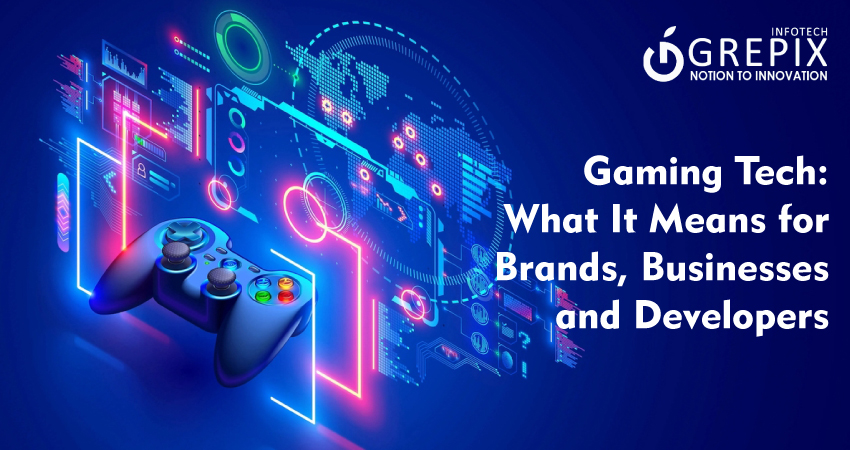Gaming Tech: What It Means for Brands, Businesses and Developers
Gaming has long been seen as a niche market for entertainment, but over the past decade, it has transformed into a multi billion-dollar global industry. With cutting-edge innovations like gamification, AI driven gameplay, and diverse revenue models, gaming tech has transcended boundaries and become integral to sectors beyond entertainment.
Today, businesses, brands, and developers are leveraging gaming technologies not just to create immersive digital worlds but also to reshape how users engage with apps, shop online, and interact socially. Whether you're a startup founder, a marketing manager, or a full-stack developer, understanding the current game development trends is crucial.
Let’s dive deep into how gaming tech is redefining business landscapes and app ecosystems worldwide.
Gaming technology is transforming more than just how we play it’s changing how businesses market, engage, and innovate. From gamification in apps to AI in game design, today’s digital experiences are more interactive and profitable than ever. Cross-platform tools like Unity and Unreal are empowering developers to reach both mobile and console audiences. Revenue models such as in-app purchases, subscriptions, and ad monetization have redefined the economics of digital platforms. With trends like cloud gaming, metaverse experiences, and blockchain-based games, the future of gaming looks bright. Brands are also tapping into this wave through in-game ads and branded virtual events. For developers, learning gaming tech isn’t optional anymore it’s a career advantage. With a trusted partner like Grepix Infotech, you can turn your gaming vision into reality and stay ahead of the curve in today’s digital marketplace.
The Rise of Gamification in Business
Gamification is the process of using game-like elements (points, rewards, badges) in non-gaming contexts. Think Duolingo’s streaks or Starbucks’ rewards system. It’s not just for fun — it’s serious business.
Why Brands Love Gamification
- Increased engagement: Users are more likely to complete tasks when there's a sense of achievement.
- Improved retention: Gamified platforms keep users coming back.
- Better data collection: Tracking progress means tracking behavior.
Real-World Examples
- Nike Run Club gamifies workouts with leaderboards and achievements.
- LinkedIn uses progress bars to encourage profile completion.
- Khan Academy awards badges to encourage consistent learning.
Gamification, when implemented well, creates emotional engagement and loyalty. That’s golden for marketers and product designers.
Artificial Intelligence in Game Development
AI has completely changed how games are built and experienced. From smarter NPCs (non-playable characters) to procedural world generation, the possibilities are mind-blowing.
Use Cases in Modern Gaming
- Dynamic Difficulty Adjustment: Games like Resident Evil 4 and Left 4 Dead adjust challenge levels based on player performance.
- Realistic NPCs: AI-powered characters adapt and learn, offering unique gameplay every time.
- Procedural Generation: Games like Minecraft and No Man’s Sky generate massive, explorable worlds using AI.
Outside traditional gaming, these technologies are being adopted by industries like healthcare (simulations), education (game-based learning), and even real estate (virtual tours).
Understanding Modern Revenue Models
Today’s games are as much about monetization as they are about gameplay. Developers are designing with ROI in mind.
Popular Monetization Strategies
- Free-to-play (F2P) + In-app purchases
- Subscription models (e.g., Apple Arcade, Xbox Game Pass)
- Ad-supported games
- Pay to play (Premium pricing)
- Hybrid models (Freemium with ads and purchases)
Why This Matters to Businesses
Monetization strategies have bled into app development across sectors. Whether you're building a fitness app or a productivity tool, lessons from game monetization can help improve profitability.
Cross-Platform Game Engines: Unity vs Unreal
Developers today have a host of game engines at their disposal. The top contenders? Unity and Unreal Engine.
Unity
- Great for mobile games, AR/VR, and 2D/3D games
- Huge asset store and community support
- C# based, beginner-friendly
Unreal Engine
- Known for high-fidelity graphics
- Ideal for AAA titles and console games
- C++ based, steeper learning curve
Comparison at a Glance
| Feature | Unity | Unreal Engine |
|---|---|---|
| Target Platforms | Mobile, AR/VR, Indie Games | PC, Console, AAA Titles |
| Coding Language | C# | C++ |
| Graphics Power | Moderate | Extremely High |
Choosing the right engine depends on your goals. A game app development company targeting mobile gamers may prefer Unity. For cinematic, console level realism, Unreal is the go-to.
Mobile vs Console Gaming: Who’s Winning?
Gaming is no longer confined to PlayStations and gaming PCs. Mobile has taken over the world.
Global Trends
- Mobile makes up over 50% of global gaming revenue (Source: Newzoo).
- Console gaming is holding strong but appeals more to hardcore players.
Key Differences
| Aspect | Mobile Gaming | Console Gaming |
|---|---|---|
| User Base | Casual, global | Hardcore, niche |
| Dev Costs | Lower | Higher |
| Monetization | Ads, IAPs (In-App Purchases) | Premium titles, DLCs |
| Platform | Android, iOS | Xbox, PlayStation |

